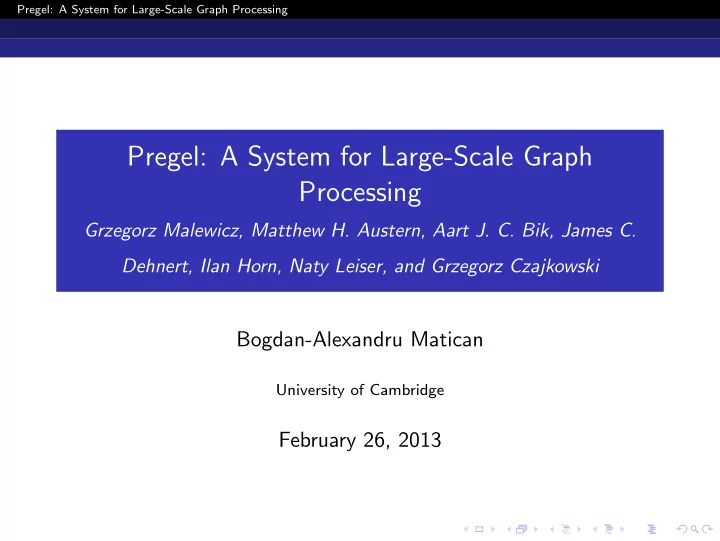

Pregel: A System for Large-Scale Graph Processing Pregel: A System for Large-Scale Graph Processing Grzegorz Malewicz, Matthew H. Austern, Aart J. C. Bik, James C. Dehnert, Ilan Horn, Naty Leiser, and Grzegorz Czajkowski Bogdan-Alexandru Matican University of Cambridge February 26, 2013
Pregel: A System for Large-Scale Graph Processing Table of contents 1 Research questions 2 Design Programming Model Usability Architecture 3 Experiments 4 Conclusion
Pregel: A System for Large-Scale Graph Processing Research questions Main considerations Typical Google system’s paper. Cross-research influences: MapReduce, Chubby, GFS, BigTable. Scalability process graphs of billions of vertexes Usability paradigm, API, features Architecture Master-Slave, network aggregation, data locality Transparency fault tolerance, commodity machines Performance resources, speed, scale
Pregel: A System for Large-Scale Graph Processing Design Programming Model Vertex local action: vertex and outgoing edges message passing communication independent state change: synchronicity
Pregel: A System for Large-Scale Graph Processing Design Programming Model System supersteps (BSP model) message based state alterations aggregation performance optimizations fault tolerance (check-pointing)
Pregel: A System for Large-Scale Graph Processing Design Usability API Design simple interface for users to understand usage pattern driven: Combiner, Aggregator, Http IO format variable for interoperability fault tolerance transparent data partitioning
Pregel: A System for Large-Scale Graph Processing Design Architecture Components and Mechanics data sharding (graph partitioning) Master (ids, sharding, sync, pings) Workers (supersteps, state, buffering) fault tolerance (check-pointing, confined recovery) performance considerations
Pregel: A System for Large-Scale Graph Processing Experiments Scalability Figure : Binary tree topology for 800 workers, 300 machines. Linear scaling of runtime for binary fan-out, high vertex count.
Pregel: A System for Large-Scale Graph Processing Experiments Scalability Figure : Social graph topology for 800 workers, 300 machines. Linear scaling of runtime for relatively sparse graphs with instances of high density.
Pregel: A System for Large-Scale Graph Processing Experiments Notes naive implementation of SSSP no input pre-processing or special sharding comparable results with state-of-the-art systems scalable considerably past points shown in paper
Pregel: A System for Large-Scale Graph Processing Conclusion Contributions programming model design simplicity concurency avoidance fault tolerance performance optimizations
Pregel: A System for Large-Scale Graph Processing Conclusion Critique and questions master failover mechanism? evaluation: good enough for us evaluation: how much faster?
Recommend
More recommend